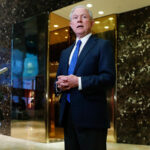
President (-elect) Trump’s Conflicts of Interest
Donald Trump’s rise to the presidency has been unusual for many reasons. Now, the nation confronts an issue it has never faced before: what to do when the incoming president is active in business projects and deals all over the world. Trump’s companies currently have business dealings in at least 20 countries, in addition to his extensive real estate holdings in the United States. This has caused Republicans and Democrats alike to voice concern over whether Donald Trump will allow his personal business interests and his role as U.S. president to affect, and possibly interfere with, one another.
A Conflict of Interest
Because Trump’s real estate holdings are so numerous and so varied, the potential for conflict of interest is quite large. Already, the line between Trump’s role as politician and his business activities has become blurred. Here in the United States, Trump has urged foreign diplomats to stay at his newly-opened hotel in downtown Washington, D.C., a few blocks from the White House. Also, the Trump brand is enjoying a surge in popularity since the election in early November. All of this benefits Trump’s company directly, mixing his political position with his business interests. Furthermore, Trump owns stock in many companies that he could easily use his position as president to help. For example, he owns stock in the controversial Dakota Access oil pipeline. As president, his financial interests could influence any action he might take regarding the pipeline.
The problem is even greater when Trump’s global business interests are examined. Recently, Donald Trump contacted Nigel Farge, the head of the U.K. Independence Party, to urge him to oppose offshore wind farms. This was because Trump worried that these wind farms might obstruct the views from Trump’s Scottish golf course. In the Philippines, where an antidrug campaign has led to the killing of thousands of suspected criminals and been condemned by both the Obama administration and human rights organizations, Trump continues to do real estate business with Jose Antonio, the special envoy to the United States. This leads many to wonder how Trump’s diplomatic policies and responses to world events could be shaped and affected by his financial ties.
In countries like India, where real estate development makes up a huge portion of the national income, officials might be tempted to allow Trump special building permits or loans in order to remain in good standing with the United States. Also, in countries such as Brazil, where Trump’s company is under investigation for failing to complete real estate projects, it is possible that foreign governments may “look the other way” to avoid risking an angry response from the White House. Furthermore, while Trump campaigned on the premise of keeping American jobs from moving overseas, his Trump Home Collection company continued to purchase and sell luxury furniture pieces made in Turkey: yet another example of the conflict between Trump’s political and business interests.
What Can Be Done?
Technically, the Constitution protects presidents from potential conflicts of interest. In other words, there is no law that specifically states that a president must not participate in business interests while in office. However, past presidents have put their assets into a “blind trust” to avoid these kinds of problems.
President-elect Trump has stated that he does not plan to do this, but instead will allow his adult children to continue running his companies after his inauguration. It is possible that Congress will put together a bipartisan subcommittee to act as a financial “watchdog.” In the meantime, Trump’s incoming chief of staff, Reince Priebus, has stated that the White House will review all of the president-elect’s business dealings for potential conflict of interest.


